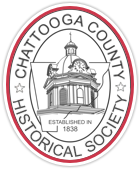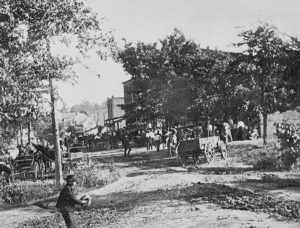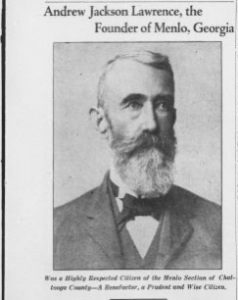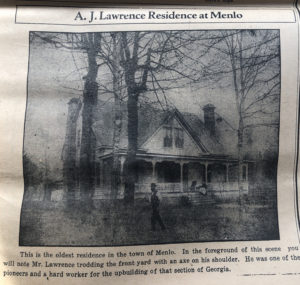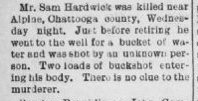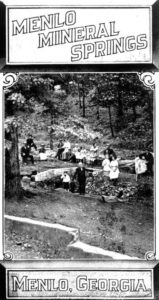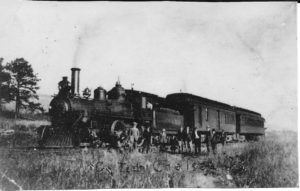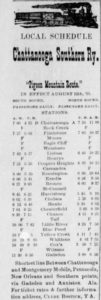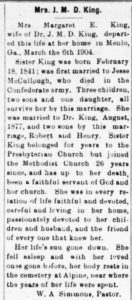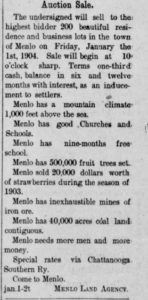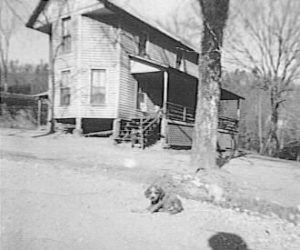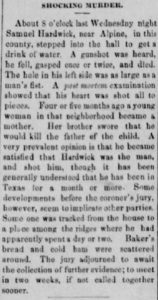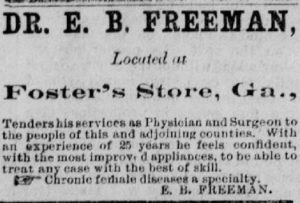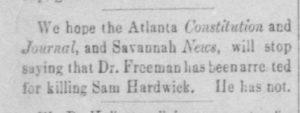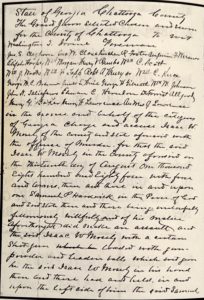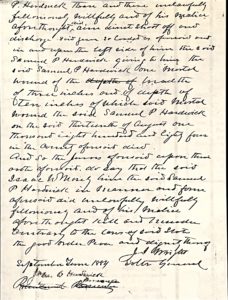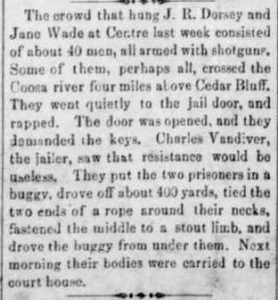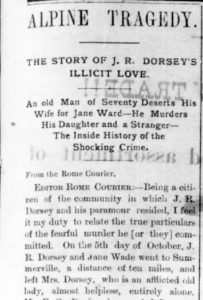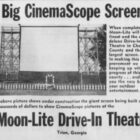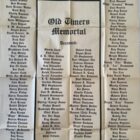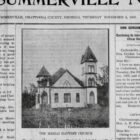Early Menlo happenings. Three murders, one unsolved.
The town of Menlo was founded in 1883 by Captain Andrew Jackson Lawrence on land that belonged to him in order to secure a post office for the area. When Captain Lawrence came to Menlo there were only two homes in the area as more people lived near Alpine.
One was his, and the other Sam P. Hardwick. Hardwick made application to open a post office in his home; the opening was July 2, 1884.
The post office was only open for six weeks when Hardwick was assassinated and Lawrence became the postmaster.
He remained in that position for about ten years. Lawrence was responsible for many things in Menlo; he donated land for a park and a monument for the men and women of the Confederacy which is still in the park.
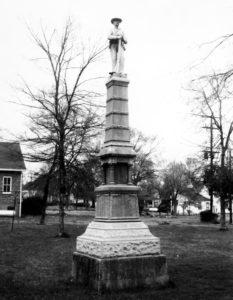 Lawrence helped to get the railroad through Menlo ( this is what made growth in Menlo and away from Alpine), acquired land for the Presbyterian Church and developed nearby Mineral Springs. Silas Lawrence, a brother, donated land for the Baptist Church and his and another brother Sidney donated the land for the Methodist Church.
Lawrence helped to get the railroad through Menlo ( this is what made growth in Menlo and away from Alpine), acquired land for the Presbyterian Church and developed nearby Mineral Springs. Silas Lawrence, a brother, donated land for the Baptist Church and his and another brother Sidney donated the land for the Methodist Church.
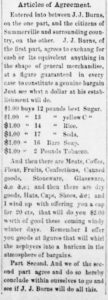 About 1840, J.J. Burns was the first merchant with a small grocery store in the area. He was also known as “The Hatchet Man” from the title of a newspaper which he owned, edited and published for a short time, This was a “unique ad” Burns had in the paper in 1889.
About 1840, J.J. Burns was the first merchant with a small grocery store in the area. He was also known as “The Hatchet Man” from the title of a newspaper which he owned, edited and published for a short time, This was a “unique ad” Burns had in the paper in 1889.
In 1889 the Chattanooga Southern Railway (which later became the Tennessee,Alabama and Georgia) began asking for rights of way through the territory. On July 3 of that year A.J. Lawrence, who with his two brothers, Sidney and Silas owned all the present site of the town, began securing the right-of-way and persuaded W. F. Henry of Chelsea to make the first grant of land. The first train ran through Menlo about June 1891.
Soon after the railroad was completed, J.H. Cooper and Company of Valley Head, Alabama, opened a general store. T.C. Golden began a planning a wood working mill in Menlo and contracted several of the new buildings which were constructed.
In 1893, T.P. Batten and his his two sons of Gadsden, Alabama first had a furniture company but after three months it was destroyed by fire. A sawmill was then started at the same site and it was destroyed by a boiler explosion that killed Battens’s two sons and James Arthur Lanier, an employee. 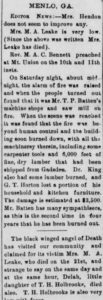
This is a mention of the fire in the Menlo Column of The Chattooga News.
The first store building on Seventh Avenue, not the main street, was a double building occupied by Z.T. Taylor, who sold meat and fancy groceries, and by Clecker and Alexander, a furniture warehouse.
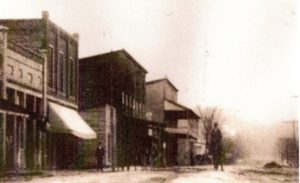
Dr. J.M.D. King built and operated, with his wife Margaret McCullough King, the first hotel in Menlo. They operated the hotel until her sudden death on March 6, 1904. After this sad event, he sold his house and boarded for several years until finally selling everything and taking a room at the hotel. Below is her obituary from The Summerville News as well as a picture of the Mobley Hotel, another hotel in Menlo at the time.
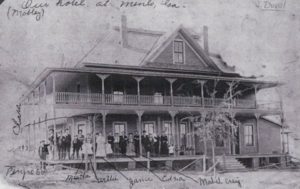
There is no picture of the King Hotel, but was another hotel in Menlo at the same time, the Mobley Hotel.
Menlo was not incorporated until 1903. One of the driving forces was the ability to tax people to support the Menlo School.
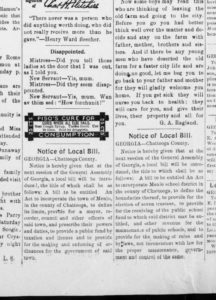
The notices in the Summerville News about the incorporation of Menlo and ability to tax for the schools
WHO KILLED SAM HARDWICK???
According to history, Andrew Jackson Lawrence and Samuel P. Hardwick built the first two homes in what is now Menlo, Georgia, These homes would have been built sometimes in the early 1880s. The area of Alpine was in and around the area that is now Menlo . The area that is south of Menlo is called Alpine now. Menlo was not incorporated until 1903.
This is the Samuel Hardwick home in years gone by. The home is still standing and looks very similar to what it was when Samuel Hardwick built it in the early 1880s.
Sam owned a saw mill and grist mill, but decided to make and application for a post office in his home. The opening was July 2, 1884, but just six weeks later Samuel P. Hardwick was assassinated on August 18,1884. The Summerville Gazette reported that ” about eight o’clock last Wednesday night, Sam Hardwick near Alpine in this county ,stepped into the hallway to get a drink of water. A gunshot was heard; he fell, gasped once or twice and died. The hole in his left side was as large as his ma’s fist. A post mortem examination showed that his heart was shot all to pieces. Four or five months ago a young woman in that neighborhood became a mother. Her brother swore that he would kill the father of the child. A very prevalent opinion is that he became satisfied that Hardwick was the man, and shot him, though it has been generally understood that he has been in Texas for a month or more. Some developments before the coroner’s jury, however seem to implicate other parties. Some one was tracked from the the house to place among the ridges where he has apparently spent a day or two. Baker’s bread and cold ham were scattered around. The jury adjourned to await the collection of further evidence to meet in two weeks if not called together sooner.”
For a while a Doctor was said to have been arrested for the murder, but this turned out to be false. Dr. Freeman was at Foster’s Store, an area between Menlo and Lyerly.
An Isaac Mosely was indicted for for the murder of Sam Hardwick in September 1884.
The document states that Isaac Mosely was to be tried for murder but no record could be found where the trial ever took place. The document shows that Isaac W. Mosely laid in wait for the opportunity to shoot Samuel. The reason that the trial never took place could be that Isaac was never found, and thus no arrest. A family story says they tracked him to Valley Head, Alabama and was believed he caught the train in Valley Head to go North. The mystery was never solved. According to Tim Day, who now lives in the house, when he was sanding the floor in the hallway, there was a stain that could not be sanded away. After obtaining the court record stating that Hardwick was shot in the hallway, it because obvious that the stain is from the blood of Sam Hardwick.
The Hardwick’s had a daughter named Mary Jo; she was born in June of 1883. Mrs. Hardwick married Mr. T.J. Worsham of Holland, Georgia in 1891. T.J. was sheriff when he and Emma married. The 1900 censes shows the Worsham family as being Thomas j., Emma V., Lula, Della Alonzo, Carrie M., Ella G. Worsham and Jodie Hardwick. Samuel P. Hardwick (December3, 1856-August 18,1884) is buried in the Alpine Cemetery. He was married to Emma V. Boyle on August 17, 1883 in Chattooga County Georgia. Emma was the daughter of Christopher C and Elizabeth Boyle who had lived in the Alpine area for many years Elizabeth ( February23, 1832-September 25, 1877) and Christopher ( August 9, 1824-May 27, 1890) are also buried in the Alpine Cemetery. Samuels parents were Frizzle and Mary Mosely were from Cherokee County, Alabama. Samuel’s mother Mary was living in the household with him and his wife at the time of his death. Samuel’s father died November 19,1869 in Cedar Bluff, Alabama and is buried in an unmarked grave in Cedar Bluff Cemetery. His mother died July 4, 1889 and is buried in Alpine Cemetery. Who killed Sam Hardwick?
THE ALPINE TRAGEDY, ANOTHER MURDER
Three months later a lady was murdered in a similar manner. She was a cousin of Sam Hardwick. Her Uncle Jake Dorsey and a prostitute were arrested for ” complicity in the deed” in the murder of Mary Davis. Later the couple was taken from their home in near Alpine across the Alabama line and taken to jail in Centre. A group of 40 men with guns took the couple from the jail and hung them in a tree near to the Alabama line. The News was reported as “Near Alpine” so there was confusion as to which state the murder happened. Davis’s house was said to have been within a quarter mile from the line.
This article clarified the actions of the mob. “They went quietly to the jail door and rapped.”
The Cartersville paper gave a very descriptive personal account pf the affair.
From the Rome Courier,
Editor Rome Courier– Being a citizen of the community in which J.R. Dorsey and his paramour resided, I feel it my duty to relate the true particulars of the of the fearful murder he (or they) committed. On the 5th day of October, J.R. Dorsey and Jane Wade went to Summerville, a distance of ten miles and left Mrs. Dorsey, who is an afflicted lady, almost helpless entirely alone.
Mr. E.C. Davis, who married Dorsey’s niece, living near by, was ready to go to church, he and his family, which consisted of wife and son, when on looking out saw that Mrs. Dorsey was coming. Mr. Davis told his wife and son to go on to church, that he would take care of the old lady himself, as he and his wife had been caring for her and ministering to her needs for seven years, and more especially this year, as they were living so near. Prompted by duty, they did her many acts of kindness, because she had no one to take care of her. At one time pulling her into the house from an approaching storm, when all had deserted her at nightfall. Mrs. Dorsey remained at Mr. Davis’s until the evening of the 6th, and she returned home. J.R. Dorsey and Jane Wade returned from Summerville that same evening, and went over to Mr. Davis’s about an hour and a half by sun, and stayed until very near sundown, cursing and swearing and using language too obscene to put before the eves of the public. Mr. Davis being in the bottom at work, over a quarter of a mile from home, could plainly hear and comprehend the meaning of the noise and knowing what was the matter, came home very quickly and found the doors and windows all closed except the back door, and old Dorsey and Jane at the front door, calling for the ax and swearing that they would break in and kill both Mr. and Mrs. Davis. Mrs. Davis saw them coming and forbade them coming in at the gate, but they heeded not. Mrs. Davis told Jane and Dorsey to go on home and eat supper and go to bed, and when they got sober they would be ashamed of their conduct. Jane told her she had plenty of whiskey at home and plenty of money to buy more, and every man in Summerville was a friend to her; that Mack White told her he would take her and give her a good home. Old Dorsey told Jane to say what she pleased, he would sustain and protect her as long as he lived. Jane said,” yes you have sustained me.” Old Jane told Mr. Davis and his wife that they would lie low that night for they were coming back, and if they didn’t they would waylay him on the way to his cotton patch in Shinbone and come back and kill his wife. They went off mad and cursing. After they went home, Mr. C.C. Jones, a stranger, called at Mr. Davis to stay all night. Mr. Davis being absent, Mrs. Davis told hime he couldn’t be accommodated unless her husband was there; But Mr. Davis soon came and told him he could stay. They were all sitting in the house, Mr. Davis sitting near the fire place, Mr. Jones sitting in the front door, Mrs. Davis sitting opposite Jones on a zinc truck. Mrs. Davis had already prepared supper and said she must go and arrange it on the table when the gun fired, killing her instantly. She ran and fell out of the door and breathed three times. Jones rushed and fell on the floor near where Mrs. Davis had been sitting; he lived until the next night about eleven o’clock and expired. Jones had twenty-one shot in her person and eleven in the chair he was sitting in. Mrs. Davis had eleven shot in her person and nine in the truck she was sitting on, beside the scattering shot that striking the wall–I suppose not less than fifty shot of all sizes, for a buckshot to a bird shot.
Old Dorsey, had been keeping Jane for about nine years on his place, forsaking his wife for her, and this year he had taken her in his own dwelling, keeping a room separate to themselves. They were both mad because Mr. and Mrs. Davis were kind to Mrs. Dorsey. They wanted her out of the way. Dorsey was so bad his grandchildren had to leave home; his house was rocked and shot into this last summer by people that were not in favor of the way he was living, while his wife was staying on the mountain. He was destitute of friends, they had all forsaken him. Old Jane shot at a man by the name of Farrar in 1876; in 1878 she shot at a man by the name of Powell. I haven’t time to write all their conduct–it would take me months perhaps years, to write their general history. It is a sad mistake that Dorsey has left a wife to mourn; he has left a wife to rejoice. Mr. Davis has been to see the old lady every day since the murder. He says he expects to be kind to her a long as he lives. Instead of a wife to mourn his loss, Dorsey leaves a wife to rejoice, and to serve God instead of Dorsey and the devil.
